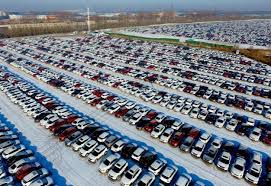
Import tariffs can be put on car and trucks into the United States in a manner similar to what was done aluminum and steel if a national security investigation into the imports launched by the Trump administration indeed shows threat to the national security of the country.
The U.S. Commerce Department said that Section 232 of the Trade Expansion Act of 1962 forms the basis of the national security probe which would examine if the import of vehicle and parts is a threat to the health of the domestic industry and the ability of the domestic industry in research and development.
“There is evidence suggesting that, for decades, imports from abroad have eroded our domestic auto industry,” Commerce Secretary Wilbur Ross said in a statement, promising a “thorough, fair and transparent investigation.”
Asian car companies that includes Toyota Motor Corp, Nissan Motor Co, Honda Motor Co and Hyundai are the ones that would primarily suffer if higher import tariffs are imposed by the U.S. because for these companies, the U.S. market is a very important one. The announcement resulted in shares of these Asian car makers going down significantly.
While China said that it would defend its interests because it is increasingly viewing the U.S. to be a potential car market for its companies, authorities in Japan, China and South Korea have said that the situation is being closely monitored by them.
“China opposes the abuse of national security clauses, which will seriously damage multilateral trade systems and disrupt normal international trade order,” Gao Feng, spokesman at the Ministry of Commerce, said at a regular news briefing in Beijing. “We will closely monitor the situation under the U.S. probe and fully evaluate the possible impact and resolutely defend our own legitimate interests.”
Many see the launch of the probe as an attempt by Trump to reach out to the voters in the industrial heartland right before mid-term elections later this year while others see this as a new chapter in his policy of “America First” aimed at increasing manufacturing h\jobs in the U.S. that have gone overseas over years.
Any import tariff would increase the cost of exporting cars and other vehicles into the second largest auto market in the world.
However, any tariff could be counterproductive for U.S. auto companies that are planning to expand into China which has relaxed investment norms for foreign auto makers, because such tariffs could spark further trade tensions with Beijing.
While Asian automakers have production units in the U.S. which produce cars and other vehicles that account for the majority of vehicles sold by them in the marke.t but some are also exported into the country from production units of Japanese and South Korean that are located in Asia, Mexico, Canada and other parts of the world.
Last year, about one third of all the vehicles that were imported into the U.S. came from Asia.,
(Source:www.reuters.com)
The U.S. Commerce Department said that Section 232 of the Trade Expansion Act of 1962 forms the basis of the national security probe which would examine if the import of vehicle and parts is a threat to the health of the domestic industry and the ability of the domestic industry in research and development.
“There is evidence suggesting that, for decades, imports from abroad have eroded our domestic auto industry,” Commerce Secretary Wilbur Ross said in a statement, promising a “thorough, fair and transparent investigation.”
Asian car companies that includes Toyota Motor Corp, Nissan Motor Co, Honda Motor Co and Hyundai are the ones that would primarily suffer if higher import tariffs are imposed by the U.S. because for these companies, the U.S. market is a very important one. The announcement resulted in shares of these Asian car makers going down significantly.
While China said that it would defend its interests because it is increasingly viewing the U.S. to be a potential car market for its companies, authorities in Japan, China and South Korea have said that the situation is being closely monitored by them.
“China opposes the abuse of national security clauses, which will seriously damage multilateral trade systems and disrupt normal international trade order,” Gao Feng, spokesman at the Ministry of Commerce, said at a regular news briefing in Beijing. “We will closely monitor the situation under the U.S. probe and fully evaluate the possible impact and resolutely defend our own legitimate interests.”
Many see the launch of the probe as an attempt by Trump to reach out to the voters in the industrial heartland right before mid-term elections later this year while others see this as a new chapter in his policy of “America First” aimed at increasing manufacturing h\jobs in the U.S. that have gone overseas over years.
Any import tariff would increase the cost of exporting cars and other vehicles into the second largest auto market in the world.
However, any tariff could be counterproductive for U.S. auto companies that are planning to expand into China which has relaxed investment norms for foreign auto makers, because such tariffs could spark further trade tensions with Beijing.
While Asian automakers have production units in the U.S. which produce cars and other vehicles that account for the majority of vehicles sold by them in the marke.t but some are also exported into the country from production units of Japanese and South Korean that are located in Asia, Mexico, Canada and other parts of the world.
Last year, about one third of all the vehicles that were imported into the U.S. came from Asia.,
(Source:www.reuters.com)





